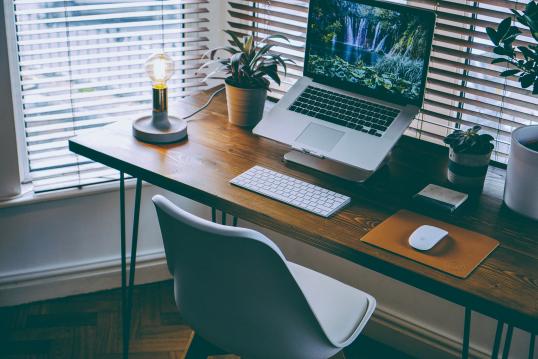1. Use second-hand office furniture
A lot of us didn’t see ourselves working from home before the pandemic, and quickly realised we weren’t prepared. As time went on, working from the kitchen table became less sustainable and we needed something comfier. Rather than buying new desks and office chairs, try to find second-hand alternatives online or in charity shops. Whether its vintage or a new model, you never know what you’ll find once you start looking!
2. Switch to energy-saving devices
Instead of leaving the house with everything switched off to commute to work, working from home may mean you need to keep the lights on in your home office throughout the day. Naturally, keeping the lights on and powering devices such as computers during the day will require extra power and is likely to affect your electricity bill. While your employer may contribute to your increased bills, small changes such as positioning your office near a window with lots of natural light or replacing your lightbulbs with energy-efficient LED bulbs could make a difference and reduce costs while helping the planet.
3. Make your office printer-free
Using a printer at home can have a significant impact on the environment as most ink cartridges aren’t recycled. If it’s not possible to work without a printer, consider using recycled cartridges which are refilled and resold. Not only are these more environmentally friendly, they often cost a lot less as well! You can also look into using recycled paper if you haven’t already.
4. Avoid buying your lunch each day
It’s often an easy and convenient option to buy your lunch at work, especially if your office is located next to grocery shops and cafes, but takeaway sandwiches and salads often involve a lot of plastic packaging. Preparing meals at home each day is an easy way to reduce your everyday waste and save money. You can also cut down on waste by making your morning tea or coffee at home instead of buying it on your way to work. Limiting your use of disposable cups and packaging will save energy and help to reduce pollution. If you do need to wrap up your lunch, re-usable containers and sandwich bags are a great alternative to one-use plastic.
5. Invest in nature
Making your workspace greener isn’t just a phrase – it’s true! Adding plants to your office setup doesn’t just make the room look better, it improves the quality of your air. Plants purify the air around you and some turn carbon dioxide into oxygen. This helps to reduce stress, leaving the environment healthier and you happier! The peace lily and spider plant are popular additions to the workplace.
Those are five of our best tips for making your work-from-home setup greener. Now try putting them into action!
Article produced in partnership with EURES, the European Job Mobility Portal.
Read more:
Find EURES Advisers
Living and working conditions in EURES countries
EURES Jobs Database
EURES services for employers
EURES Events Calendar
Upcoming Online Events
EURES on Facebook
EURES on Twitter
EURES on LinkedIn
Details
- Publication date
- 28 May 2021
- Authors
- European Labour Authority | Directorate-General for Employment, Social Affairs and Inclusion
- Topics
- Youth
- Related section(s)
- Sector
- Accomodation and food service activities
- Activities of extraterritorial organisations and bodies
- Activities of households as employers, undifferentiated goods- and services
- Administrative and support service activities
- Agriculture, forestry and fishing
- Arts, entertainment and recreation
- Construction
- Education
- Electricity, gas, steam and air conditioning supply
- Financial and insurance activities
- Human health and social work activities
- Information and communication
- Manufacturing
- Mining and quarrying
- Other service activities
- Professional, scientific and technical activities
- Public administration and defence; compulsory social security
- Real estate activities
- Transportation and storage
- Water supply, sewerage, waste management and remediation activities
- Wholesale and retail trade; repair of motor vehicles and motorcycles
